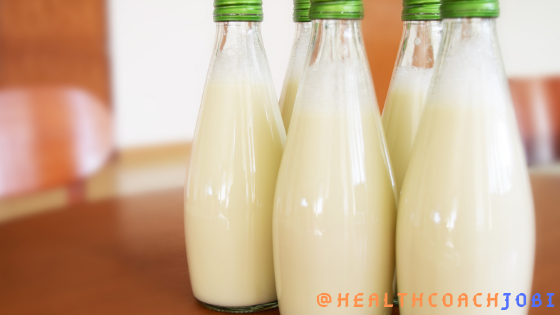Having a food intolerance is not fun. It can cause abdominal pain, discomfort, flatulence, diarrhea and nausea.
Other symptoms linked to food intolerances include muscle or joint pain, headaches, exhaustion, and even skin symptoms like rashes and eczema.
Let’s learn about Dairy Intolerance (Lactose, Casein, and Whey).
By the way do you have any digestion issues?

Dairy is just one of those foods that many people seem to be intolerant, let’s find out why
Main components of milk that people react to: lactose, casein, and whey.
Milk sugar (lactose) intolerance
It’s estimated that up to 75% of adults are lactose intolerant.
Lactose is the carbohydrate “milk sugar” naturally found in most dairy products.
Lactose intolerance is so common you can buy lactose-free milk in your regular grocery store.
Lactose-free products are treated with the enzyme “lactase” that breaks the lactose down before you ingest it.
It’s this lactase enzyme that is lacking in most people who are lactose intolerant.
The lactase enzyme is naturally released from your intestine as one of your digestive enzymes.
It breaks down the lactose sugar in the gut.
When someone doesn’t have enough lactase, the lactose doesn’t get broken down the way it should.
Undigested lactose ends up being food for the resident gut microbes.
As they ferment the lactose, they create gases that cause bloating, flatulence, pain, and sometimes diarrhea.
Lactose is in dairy but is in lower amounts in fermented dairy (e.g. cheese & yogurt) and butter.
Steering clear of lactose isn’t that easy as it is added to other foods like baked goods, soups, and sauces.
And if you’re taking any medications or supplements, check to see if it’s in there too, as lactose is a common ingredient in them.
If you have symptoms of lactose intolerance, keep an eye on food, medication, and supplement labels.
Milk protein (casein & whey) allergy
Milk is a known food allergen but do you know why?
You may heard of “curds or whey, these are the two main proteins in milk.
The solid bits are the curds (made of casein), and the liquid is the dissolved whey.
Unlike lactose intolerance, casein and whey can cause an actual immune response.
It’s an allergy.
And this immune response can cause inflammation.
In fact, we don’t know how many people have these milk allergies, but most estimates put it far below that of lactose intolerance.
Like lactose, these allergenic milk proteins can be found in other products too.
They’re not just in dairy but are often in protein powders as well.
(Have you heard of “whey” protein powders?).
Some of the symptoms of milk protein allergy differ from that of lactose intolerance; things like nasal congestion and mucus (phlegm) are more common here.
And casein seems to be linked with belly fat. Interestingly, people who have gluten intolerance are often allergic to milk proteins like whey and casein as well. These can go hand-in-hand.
Like lactose intolerance, if you’re allergic to casein and whey keep an eye on labels so you can avoid these.
Conclusion
If you get gassy, bloated, or diarrhea after eating dairy, you may have a lactose intolerance.
If you often get a stuffy nose and mucus, then you may be allergic to casein and/or whey.
While dairy may be an entire food group, it is not an essential nutrient.
All the nutrients in dairy are available in other foods.
If you experience these symptoms, you can try removing dairy from your diet.
You may find improved digestion and fewer gut issues or you may find improved nasal congestion, or even less belly fat.
If you decide to (or have already) removed dairy from your diet, let me know your experience in the comments below.
As a health coach, my recommendation to you is to find out the food which is making you digestive issues and avoid it.
Remember undigested food is unhealthy food.
Click Here to Subscribe to Coach Jobi’s Channel through YouTube
Click Here to Connect with Coach Jobi via Facebook
Click Here to Connect with Coach Jobi via Instagram
References:
https://authoritynutrition.com/11-proven-ways-to-reduce-bloating/
https://www.dietvsdisease.org/how-to-get-rid-of-bloating/
https://www.dietvsdisease.org/11-warning-signs-you-have-a-food-intolerance/
https://authoritynutrition.com/dairy-foods-low-in-lactose/
https://authoritynutrition.com/lactose-intolerance-101/
http://www.precisionnutrition.com/whey-protein-allergies-intolerances-bloating
http://www.precisionnutrition.com/all-about-food-sensitivities
https://www.thepaleomom.com/the-great-dairy-debate/
https://nutritionfacts.org/video/is-milk-and-mucus-a-myth/
https://nutritionfacts.org/video/milk-protein-vs-soy-protein/
https://examine.com/supplements/casein-protein/
https://examine.com/supplements/whey-protein/
http://foodallergycanada.ca/about-allergies/food-allergens/milk/
http://www.health.harvard.edu/blood-pressure/milk-protein-may-lower-blood-pressure


